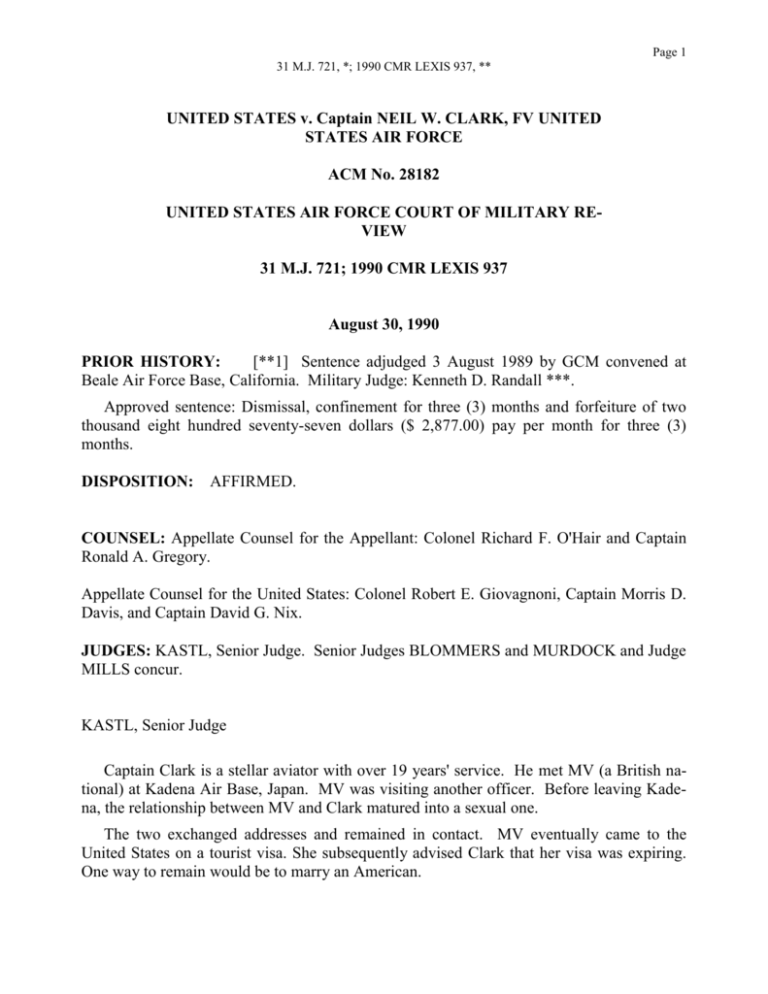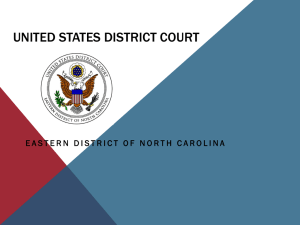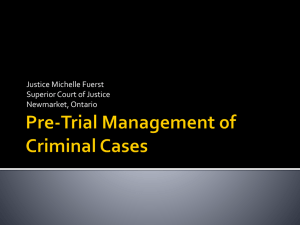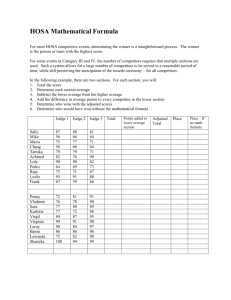Clark
advertisement

Page 1 31 M.J. 721, *; 1990 CMR LEXIS 937, ** UNITED STATES v. Captain NEIL W. CLARK, FV UNITED STATES AIR FORCE ACM No. 28182 UNITED STATES AIR FORCE COURT OF MILITARY REVIEW 31 M.J. 721; 1990 CMR LEXIS 937 August 30, 1990 PRIOR HISTORY: [**1] Sentence adjudged 3 August 1989 by GCM convened at Beale Air Force Base, California. Military Judge: Kenneth D. Randall ***. Approved sentence: Dismissal, confinement for three (3) months and forfeiture of two thousand eight hundred seventy-seven dollars ($ 2,877.00) pay per month for three (3) months. DISPOSITION: AFFIRMED. COUNSEL: Appellate Counsel for the Appellant: Colonel Richard F. O'Hair and Captain Ronald A. Gregory. Appellate Counsel for the United States: Colonel Robert E. Giovagnoni, Captain Morris D. Davis, and Captain David G. Nix. JUDGES: KASTL, Senior Judge. Senior Judges BLOMMERS and MURDOCK and Judge MILLS concur. KASTL, Senior Judge Captain Clark is a stellar aviator with over 19 years' service. He met MV (a British national) at Kadena Air Base, Japan. MV was visiting another officer. Before leaving Kadena, the relationship between MV and Clark matured into a sexual one. The two exchanged addresses and remained in contact. MV eventually came to the United States on a tourist visa. She subsequently advised Clark that her visa was expiring. One way to remain would be to marry an American. Page 2 31 M.J. 721, *; 1990 CMR LEXIS 937, ** MV was unsuccessful in locating [**2] a suitable partner, so Clark offered to marry her. He cautioned that their arrangement must be covert since he was already married. In November 1988, Clark executed a Nevada marriage license application representing that he was free to marry; he then wed MV at the Heart of Reno Chapel in Nevada. That same day, Clark signed a United States Department of Justice form entitled "Petition for Alien Relative." Despite his pleas, Clark was found guilty, by a general court-martial with members, of bigamy and wrongful marriage to evade the immigration laws, in [*723] violation of Article 134, UCMJ; and conduct unbecoming an officer -- making false statements to state authorities that he was free to marry -- in violation of Article 133, UCMJ. His approved sentence is a dismissal, forfeiture of $ 2,877.00 pay per month for three months, and confinement for three months. I Captain Clark argues that the military judge unfairly denied a defense motion for recusal based upon bias against his civilian attorney. The appellant also contends that said bias persisted throughout the trial, depriving him of an overall fair hearing. Civilian counsel's Article 38(c) brief characterizes this [**3] court-martial as "not a high point of dignity for the Air Force judiciary." Instead, counsel insists, "the military judge's prior behavior towards the same civilian defense counsel, his extrajudicial statements expressing hostility toward the civilian counsel, and his pretrial conduct in the case sub judice all indicate that recusal was not only appropriate but required." The Article 38(c) brief upbraids the judge for exhibiting animosity, an acerbic attitude, and hostility towards the civilian attorney. The Government vehemently rejects any notion that the military judge displayed personal animus against the appellant or his counsel. Instead: The Government contends that, in light of the incessant repetition of civilian defense counsel's motions, his failure to accept any ruling of the military judge, and the overall nature of his conduct, that this military judge conducted himself in an exemplary manner. In light of this record, it can fairly be said that accepting appellant's argument would place a new weapon in the defense counsel's arsenal: obstreperousness. Society does not have enough judges to require disqualification whenever a defense counsel engages in such [**4] tactics. We begin analysis with the tenet that a militaryjudge -- like his civilian counterpart -- is obligated to disqualify himself in any proceeding in which his impartiality reasonably might be questioned. R.C.M. 902(a); United States v. Smith, 30 M.J. 631, 634 (N.M.C.M.R. 1990) and cases cited. The burden of proof is on the party seeking disqualification. United States v. Wright, 47 C.M.R. 637 (A.F.C.M.R. 1973), pet. denied, 48 C.M.R. 1000 (C.M.A. 1973); Idaho v. Freeman, 478 F. Supp. 33 (D.C. Idaho 1979); United States v. Baker, 441 F. Supp. 612 (M.D. Tenn. 1977) (extensive citations in both cases). See generally Southern Pacific Page 3 31 M.J. 721, *; 1990 CMR LEXIS 937, ** Communications v. A.T. & T., 238 U.S. App. D.C. 309, 740 F.2d 980 (D.C. Cir. 1984) and Kuhnell, Challenging the Military Judge, A.F.L. Rev. 50, 62-63 (Winter 1975). Recusal or disqualification is grounded on the trial judge's sound discretion; the standard of review on appeal is whether the judge abused that discretion under R.C.M. 902. Smith, 30 M.J. at 634; United States v. Talbott, 12 U.S.C.M.A. 446, 31 C.M.R. 32 (1961). [**5] A military judge's disclaimer of partiality carries great weigiht. United States v. Kratzenberg, 20 M.J. 670, 672 (A.F.C.M.R. 1985); United States v. Montgomery, 16 M.J. 516, 518 (A.C.M.R. 1983); see also In re Drexel Burnham Lambert, Inc., 861 F.2d 1307 (2d Cir. 1988); In re United States, 666 F.2d 690 (1st Cir; 1981); Potashnick v. Port City Construction Co., 609 F.2d 1101, 1111 (5th Cir. 1980); see generally United States v. Stroup, 29 M.J. 224, 231-232 (C.M.A. 1989). In light of the precedents listed, we find no error in the military judge refusing to recuse himself. Furthermore, after examining the entire record, we find no error in the proceedings prejudicial to the substantial rights of Captain Clark. We will say more at the end of this opinion about civility between trial judge and attorney. For the present, we emphasize that almost all of the complained-of incidents occurred outside the presence of the members. Thus, nothing contained within those unfortunate and often-heated exchanges influenced the voting members. We have also assessed a small handful of allegedly-percussive [**6] exchanges occurring [*724] in the members' presence. We find little at this juncture beyond the usual give and take of a hard-fought legal contest. Therefore, the defense argument fails. In reaching this conclusion, we have considered both the examples cited in the Article 38(c) brief as supposedly indicating bias as well as all other exchanges within the transcript. II Civilian counsel claims that he was unfairly denied a security clearance. Such clearance, he avers, would enable the defense team to discuss relevant classified aspects of Captain Clark's duties and perhaps plan a defense strategy focusing on the appellant's job stress. There was no use of classified data in this case and no showing that security matters were material to any reasonable line of defense or mitigation. See Mil. R. Evid. 505(i)(4)(B). We hold that the military judge acted reasonably and did not abuse his discretion. See United States v. Gagnon, 21 U.S.C.M.A. 158, 44 C.M.R. 212 (1972); United States v. Baasel, 22 M.J. 505 (A.F.C.M.R. 1986); United States v. Herrington, 33 C.M.R. 814 (A.F.B.R 1963); see generally Maher, The Right [**7] to a Fair Trial in Criminal Cases Involving the Introduction of Classified Information, 120 Mil. L. Rev. 83, 115-116 (Spring 1988). III The appellant suggests that his counsel was improperly gagged by an order of the military judge. The military judge had originally banned "extrajudicial statements to the media or any other person concerning the facts surrounding this case." Page 4 31 M.J. 721, *; 1990 CMR LEXIS 937, ** A presiding judge is responsible for the orderly conduct of the court-martial, and his oversight powers are indeed considerable. See the in-chambers decision of Chief Justice Rehnquist in KPNX Broadcasting Co v. Arizona Superior Court, 459 U.S. 1302, 103 S. Ct. 584, 74 L. Ed. 2d 498 (1982); Annot., 5 A.L.R. Fed. 948 (1970). A gag order on publicity in the press may well have been proper, under the circumstances. However, we will not resolve the assignment of error on such a broad basis. The military judge elected to reverse his ruling within about 35 minutes. We find the possibility of counsel's efforts being chilled de minimis. There was no error here affecting Clark's substantial rights. IV The military judge properly denied both a defense [**8] challenge to the venire and a motion for a change of venue. The appellant had argued that he could not receive a fair trial at Beale Air Force Base, California, where the court was convened, because of his reputation for womanizing. We conclude that he failed to carry the burden of showing the voting members were biased. See United States v. Townsend, 12 M.J. 861, 862 (A.F.C.M.R. 1981); United States v. Cunningham, 21 M.J. 585, 586 (A.C.M.R. 1985). V Over defense protests, a prosecution expert was permitted to sit in the courtroom during the defense expert's testimony. Recent decisions clarify that the appellant's objection to this procedure is without merit. See United States v. Gordon, 27 M.J. 331 (1989); United States v. Croom, 24 M.J. 373 (1987). VI There was no need for a new Article 32 investigation. For purposes of this assignment of error, we have examined the Article 32 investigation, contained within the "blue covers" of the eight-volume transcript. The investigating officer's report was painstakingly detailed. It consists of 35 exhibits and 17 pages of close analysis. We conclude that [**9] the report was even-handed. Indeed, the investigating officer favored the defense in numerous ways. We find the Article 32 investigation eminently adequate. See United States v. Svoboda, 12 M.J. 866 (A.F.C.M.R. 1982.) The Article 32 report indicates that draft witness statements would be shown [*725] to the defense if possible. Failure to clear such drafts with the defense has called forthan objection by the appellant. We find no error. Even if the Investigating Officer somehow "spoke for the Government" and somehow promised the defenders a chance to review these statements before the report was finalized, that generosity was contingent: "if possible." VII The other matters raised by the appellant are resolved adversely to him. See generally United States v. Aker, 19 M.J. 733 (A.F.C.M.R. 1984), pet. denied, 20 M.J. 133 (C.M.A. 1985); United States v. Bender , 30 M.J. 815, 820 (A.C.M.R. 1990); United States v. Flem- Page 5 31 M.J. 721, *; 1990 CMR LEXIS 937, ** ing, 19 C.M.R. 438, 448 (A.B.R. 1955); See also Mil. R. Evid. 801(c); United States v. Hood, 12 M.J. 890 (A.C.M.R. 1982). VIII At this juncture, [**10] we pause to consider the conduct of the military judge and civilian counsel. One legal philosopher has written that the highest points in an advocate's life arrive when: forgetting the niceties of the codes, the arts of oratory, the technique of debating, unconscious of his robes or those of the judges, he turns to the judges, looking into their eyes as into the eyes of an equal, and speaks to them in the simple words a man uses to convince his fellow man of the truth . . . These moments of humble and solemn sincerity repay the lawyer for all his labor. * * Calamandrei, Eulogy of Judges (Princeton, NJ; 1946) 6-7. This trial fell far short of such times of exaltation. Instead, counsel and the military judge bickered continuously. Upon reflection, we think nothing profitable would come from speaking further of the verbal jousting of the military judge and counsel. As indicated earlier, we are convinced that nothing therein deprived the appellant of a fair trial. We will speak to future cases [**11] and inquire as to what is required of a judge in the face of unruly behavior of counsel? A military judge is bound by the American Bar Association Code of Judicial Conduct; the Canons of Judicial Ethics; and the Air Force Standards for the Administration of Criminal Justice. Furthermore -- to the extent practicable -- a judge is governed by the American Bar Association Standards for Criminal Justice. OTJAG Letter JA 89-5, "Rules of Professional Responsibility and Air Force Standardsfor the Administration of Criminal Justice" (4 December 1989), Atch. 2. See generally Air Force Regulation 1111, Military Justice Guide, para. 1-6 (9 March 1990); DA Pam 27173, Trial Procedure, para. 3-4 (20 April 1990). The military judge -- an unbiased umpire -- must rule in a reflective, self-restrained, and temperate manner. See generally United States v. Stroup, 29 M.J. 224, 233-234 (C.M.A. 1989); United States v. Lewis, 16 U.S.C.M.A. 145, 36 C.M.R. 301; (1966); United States v. Biesak, 3 U.S.C.M.A. 714, 14 C.M.R. 132 (1954); United States v. Cannon, 26 C.M.R. 593 (A.B.R. 1958). But what if the exchange between judge [**12] and counsel becomes heated? Their courtroom conduct need not be chummy, for disputes and "rhubarbs" are part of the American courtroom scene, far different from the "indeed, my Lord" approach of our British forebears. Nevertheless -- and we say it quite plainly -- when the military judge rules, as when he indicates that discussion is closed and the parties must move forward, counsel disobey at their peril. Page 6 31 M.J. 721, *; 1990 CMR LEXIS 937, ** For the future, we are confident that military judges enjoy an ample arsenal of sanctions to deter and correct attorney misbehavior should corrective comments or persuasion fail. They should not hesitate to use them if the situation demands. Possibilities include reporting the contemner to his or her disciplinary and licensing authorities; fines; and even jail for the particularly recalcitrant. All concerned should be thoroughly familiar with Article 48, [*726] UCMJ and Air Force Standards for the Administration of Military Justice 6-1 and 6-3. That guidance is clear-cut and need not be repeated here. See also Hennessey, Courts-Martial Contempt -An Overview, Army Lawyer (June 1988) p. 38; Lancaster, Disruption in the Courtroom: The Troublesome Defendant [**13] , 75 Mil. L. Rev. 35 (Winter 1977). Representative precedents are United States v. Burnett, 27 M.J. 99 (C.M.A. 1988); United States v. DeAngelis, 3 U.S.C.M.A. 298, 12 C.M.R. 54, 60 (1952); see generally United States v. Garwood, 20 M.J. 148 (C.M.A. 1985); United States v. Jarvis, 22 U.S.C.M.A. 260, 46 C.M.R. 260 (1973); 17 Am. Jur. Contempt Secs. 25, 58 (1964); Annot., 68 A.L.R.3d 273, 280-281 (1976). The findings of guilty and the sentence are correct in law and fact and, upon the basis of the entire record, are AFFIRMED.









